Candida tropicalis-derived vitamin B3 exerts protective effects against intestinal inflammation by promoting IL-17A/IL-22-dependent epithelial barrier function
- PMID: 39462273
- PMCID: PMC11524206
- DOI: 10.1080/19490976.2024.2416922
Candida tropicalis-derived vitamin B3 exerts protective effects against intestinal inflammation by promoting IL-17A/IL-22-dependent epithelial barrier function
Abstract
Candida tropicalis-a prevalent gut commensal fungus in healthy individuals - contributes to intestinal health and disease. However, how commensal C. tropicalis influences intestinal homeostasis and barrier function is poorly understood. Here, we demonstrated that the reference strain of C. tropicalis (MYA-3404) ameliorated intestinal inflammation in murine models of chemically induced colitis and bacterial infection. Intestinal colonization of C. tropicalis robustly upregulated the expression of IL-17A and IL-22 to increase barrier function and promote proliferation of intestinal epithelial cells in the mouse colon. Metabolomics analysis of fecal samples from mice colonized with C. tropicalis revealed alterations in vitamin B3 metabolism, promoting conversion of nicotinamide to nicotinic acid. Although nicotinamide worsened colitis, treatment with nicotinic acid alleviated disease symptoms and enhanced epithelial proliferation and Th17 cell differentiation. Oral gavage of C. tropicalis mitigated nicotinamide-induced intestinal dysfunction in experimental colitis. Blockade of nicotinic acid production with nicotinamidase inhibitors lowered the protective effects against colitis in mice treated with C. tropicalis. Notably, a clinical C. tropicalis strain isolated from patients with candidemia lacked the protective effects against murine colitis observed with the reference strain. Together, our results highlight a novel role for C. tropicalis in resolving intestinal inflammation through the modulation of vitamin B3 metabolism.
Keywords: Candida tropicalis; IL-17A; IL-22; epithelial barrier function; epithelial cell proliferation; inflammatory bowel disease; mucosal immunity; vitamin B3.
Plain language summary
• Protection against colitis conferred by intestinal colonization of Candida tropicalis depends on metabolic activity and strain• C. tropicalis MYA-3404 supplementation promotes intestinal epithelial barrier function through IL-17A and IL-22 expressed by Th17 cells, γδ T cells, and ILC3• MYA-3404 strain uses its enzymatic activity to modulate vitamin B3 metabolism for protective benefits.
Conflict of interest statement
No potential conflict of interest was reported by the author(s).
Figures

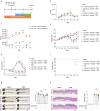


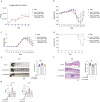
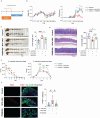
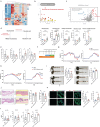
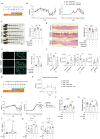
References
-
- Alatab S, Sepanlou SG, Ikuta K, Vahedi H, Bisignano C, Safiri S, Sadeghi A, Nixon MR, Abdoli A, Abolhassani H, et al. The global, regional, and national burden of inflammatory bowel disease in 195 countries and territories, 1990–2017: a systematic analysis for the global burden of disease study 2017. Lancet Gastroenterol Hepatol. 2020;5(1):17–30. doi: 10.1016/S2468-1253(19)30333-4. - DOI - PMC - PubMed
MeSH terms
Substances
LinkOut - more resources
Full Text Sources
